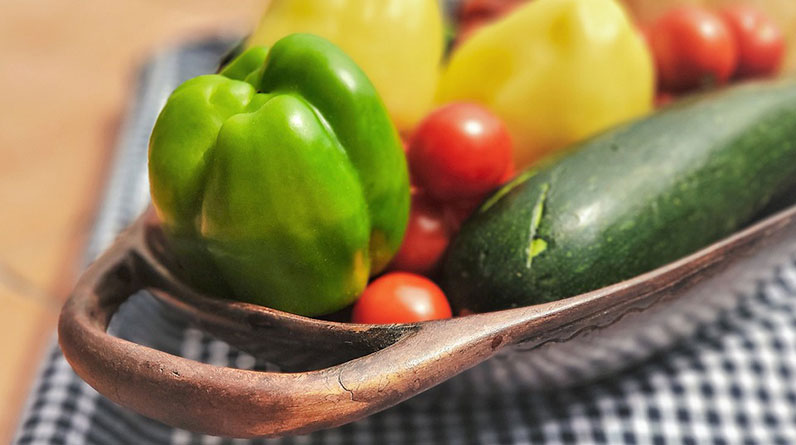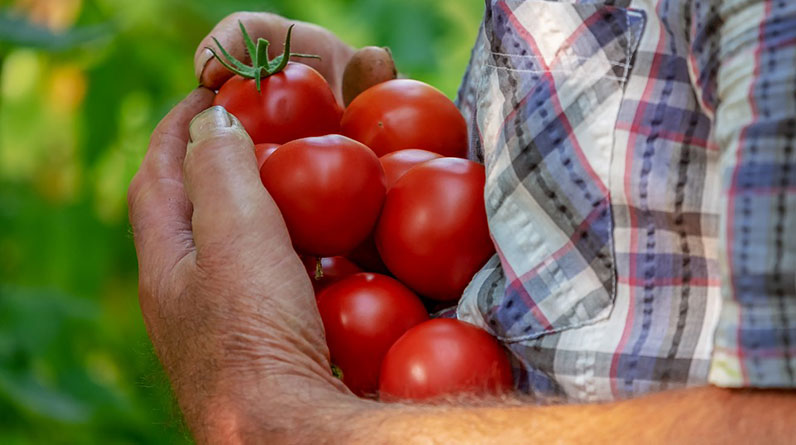
Top 10 Organic Fruits and Vegetables
If you’re new to organic gardening, you may be wondering which fruits and vegetables are the best to grow at home. Here are the top 10 organic fruits and vegetables that are well-suited for home gardening:
Tomatoes: Tomatoes are a popular choice for home gardeners, and for good reason. They are relatively easy to grow, and can be enjoyed in a variety of dishes, from salads and sandwiches to sauces and soups. To get the best results, choose a sunny location and water regularly.
It is also important to provide proper support for your tomato plants, as they can grow tall and produce heavy fruit. You can use stakes, cages, or trellises to keep your plants upright and prevent them from toppling over.
Additionally, it is important to prune your tomato plants regularly to encourage healthy growth and to remove any diseased or damaged foliage. Overall, with proper care and attention, you can enjoy a delicious and productive harvest of tomatoes from your own home garden.
Salad greens: Leafy greens such as lettuce, spinach, and arugula are easy to grow and can provide a steady supply of fresh, nutritious produce.
Salad greens are also well-suited to container gardening, as they do not require a lot of space and can be grown in a wide range of containers. Just be sure to choose a container with good drainage, and water regularly to prevent the soil from drying out.
Salad greens prefer well-draining soil that is rich in organic matter, such as compost or well-rotted manure. They also benefit from regular fertilization, especially with a balanced fertilizer that contains nitrogen, phosphorus, and potassium.
Salad greens can also be grown in raised beds or in-ground, and can be grown from seeds or transplants. With proper care and attention, you can enjoy a steady supply of fresh, nutritious salad greens from your own home garden.
Carrots: Carrots are a cool-season crop that are well-suited to home gardens. They can be grown in a variety of soil types and are relatively easy to care for. Just be sure to choose a location with well-draining soil and water regularly.
Be sure to water regularly, as they need a consistent supply of moisture to grow properly. You may also need to thin out your carrot plants as they grow to ensure that they have enough space to develop their roots. With proper care and attention, you can enjoy a delicious and productive harvest of carrots from your own home garden.
Beets: Beets are another cool-season crop that are well-suited to home gardening. They are easy to grow and can be enjoyed in a variety of dishes, from salads to soups and roasted vegetables. Just be sure to choose a location with well-draining soil and water regularly.
Beets are also relatively easy to care for, as they do not require a lot of maintenance. Just be sure to water regularly, as they need a consistent supply of moisture to grow properly. You may also need to thin out your beet plants as they grow to ensure that they have enough space to develop their roots.
Squash: Squash are a warm-season crop that are easy to grow and provide a delicious, versatile addition to any meal. They can be grown in a variety of soil types.
Squash are also relatively easy to care for, as they do not require a lot of maintenance. Just be sure to choose a sunny location and water regularly, as they need a consistent supply of moisture to grow properly.
You may also need to provide support for your squash plants, as they can grow tall and produce heavy fruit. You can use stakes, cages, or trellises to keep your plants upright and prevent them from toppling over.
Beans: Beans are another easy-to-grow vegetable that can provide a steady supply of fresh produce. They can be grown in a variety of soil types and are well-suited to both container and in-ground gardens. Be sure to choose a sunny location and water regularly.
Beans prefer well-draining soil that is rich in organic matter, such as compost or well-rotted manure. They also benefit from regular fertilization, especially with a balanced fertilizer that contains nitrogen, phosphorus, and potassium. You can use organic fertilizers, such as compost or bone meal, to provide essential nutrients to your bean plants.
Peppers: Peppers are a warm-season crop that are well-suited to home gardening. They can be grown in a variety of soil types and are relatively easy to care for. Just be sure to choose a sunny location and water regularly.
You may also need to provide support for your pepper plants, as they can grow tall and produce heavy fruit. You can use stakes, cages, or trellises to keep your plants upright and prevent them from toppling over.
Eggplants: Eggplants are a warm-season crop that are well-suited to home gardening. They can be grown in a variety of soil types and are relatively easy to care for. Just be sure to choose a sunny location and water regularly.
Cucumbers: Cucumbers are a warm-season crop that are easy to grow and provide a refreshing addition to any meal. They can be grown in a variety of soil types and are well-suited to both container and in-ground gardens. Just be sure to choose a sunny location and water regularly.
Strawberries: Strawberries are a popular choice for home gardeners, and for good reason. They are relatively easy to grow, and provide a delicious, sweet treat that can be enjoyed fresh or used in a variety of dishes. To get the best results, choose a sunny location and water regularly.
You may also need to provide support for your strawberry plants, such as using a straw mulch to keep the fruit off the ground and prevent rot.
Conclusion
By growing these 10 organic fruits and vegetables, you can enjoy a steady supply of fresh, nutritious produce all season long. With a little planning and effort, you can have a thriving organic garden that provides delicious and healthy food for your family and friends.
As you plan your organic garden, it’s important to remember that different fruits and vegetables have different growing requirements. Be sure to do your research and choose plants that are well-suited to your climate and soil type, and follow the recommended planting and care instructions to give your plants the best chance of success.
It’s also a good idea to start small and gradually expand your garden as you gain experience. This can help to reduce the risk of failure and allow you to learn from any mistakes you may make along the way.
Finally, be sure to keep track of your garden and make note of what works well and what doesn’t. This can help you to fine-tune your gardening techniques and make adjustments as needed.
With a little patience and persistence, you can enjoy the many benefits of growing your own organic fruits and vegetables at home. Whether you’re a seasoned pro or a beginner, there’s always something new to learn and discover in the world of organic gardening.

